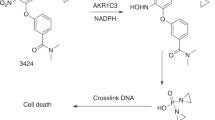Abstract
Background: T900607 is a novel tubulin active agent which disrupts microtubule polymerization by a unique mechanism of action. This phase I trial was conducted to determine the maximum tolerated dose, recommended phase II dose, pharmacokinetic properties and toxicities of this agent. Patients and methods: Patients with advanced and/or metastatic solid malignancies were enrolled, for an open dose escalation of T900607 administered intravenously over 30 minutes every 21-days. Results: Thirty patients were enrolled on 7 dose levels ranging from 15 to 270 mg/m2. No DLTs were seen until 270 mg/m2, the sixth dose level, with 1 patient experiencing Grade 3 thrombocytopenia, 1 grade 4 troponin increase and 1 grade 5 myocardial infarction in an expanded cohort of 6 patients. The dose was decreased to 180 mg/m2 with increased cardiac monitoring and at this dose 3/4 patients experienced cardiac toxicity. Further animal cardiotoxicity studies failed to reveal any cardiac effects and the study was reopened at 130 mg/m2; of 6 enrolled patients, 1 had grade 3 drug related lethargy considered to be a DLT and this dose was considered the RP2D. No objective responses were seen but stable disease was reported in 7/20. Pharmacokinetic analysis showed that AUC and Cmax increased with dose with considerable intrapatient variability, a short half life of < 1 hour, and no apparent dose dependency clearance. Conclusions: The recommended phase II dose for T900607 is 130 mg/m2 given as an intravenous infusion over 60 minutes on a 21-day cycle. Cardiac toxicity was seen with this schedule.
Similar content being viewed by others
References
Dumont C, Sikic BI: Mechanism of alteration of and resistance to antitubulin agents; microtubules dynamics, drug transport and cell death. J Clin Oncol 17: 1061–1078, 1999
Drukman S, Kavallaris M: Microtubule alteration and resistance to tubulin binding agents (Review). Int Jour of Oncol 21: 621–628, 2002
Teng M, Bartholomew J, Bissel M: Synergism between anti-microtubule agents and growth stimulants in enhancement of cell cycle traverse. Nature 268: 739–41, 1977
Jordan MA: Mechanism of action of antitumor drugs that interact with microtubules and tubulin. Current Med Chem-Anticancer Agents 21: 1–17, 2002
Lewis SA, Cowen MJ: Tubulin genes, structure, expression and regulators of microtubule proteins. In: Avila J. (ed), CRC Press Inc. TL pp. 37–66, 1999
Kavallaris M, Kuo DY-S, Burkart CA, Regl DL, Norris MD, Haber M, Horowitz SB: Taxol resistant epithelial ovarian tumors are associated with altered expression of specific β tubulin isotypes. J Clin Inves 100: 1282–1293, 1999
Borst P, Evers R, Kool M, Wijnholds J: A family of drug transporters: the multidrug resistant proteins. J Natl Cancer Inst 92: 1295–1302, 2000
Investigators Manual for T900607. Tularik Inc. 2000
Therasse P, Arbuck SG, Eisenhauer EA, Wanders J, Kaplan RS, Rubinstein C, Verweij J, Van Glabbeke M, Van Oosterom AT, Christian MC, Gwyther SG: New guidelines to evaluate the response to treatment in solid tumours. European Organization for Research and Treatment of Cancer, National Cancer Institute of United States, National Cancer Institute of Canada. J Natl Cancer Inst 92: 205–16, 2000
Heidenreich PA, Alloggiamento T, Melsop K, McDonald KM, Go As, Hlatky MA: The Prognostic Value of troponin in patients with non ST elevation acute coronary syndromes; a meta-analysis. Jour of Am Col of Cardio 38: 478–485, 2001
Morrow DA, Cannon CP, Rifai N, Frey MJ, Vicari R, Lakkis N, Roberson DH, Hille DA, Delucca PT, DiBattisti PM, Demopoulos LA, Weintraub WS, Braunwald E: Ability of minor elevations of troponins I and T to predict benefit for an early invasive strategy in patients with unstable angina and non ST elevation myocardial infarctions; results from randomized trials. JAMA 286: 2405–2412, 2001
Antman EM, Tranasijevic MJ, Thompson B, Schactman M, McCabe CH, Cannon CP, Fischer GA, Fung AY, Thompson C, Wybenga D, Braunwald E: Cardiac specific troponin I levels predict the risk of mortality in patients with acute coronary syndromes. NEJM 335: 1342–1349, 1996.
Wu AH, Apple FS, Gibler WB, Jesse RL, Warshaw MM, Valdes R Jr: National academy of clinical biochemistry standards of laboratory practice: recommendations for the use of cardiac markers in coronary artery diseases. Clin Chem 45: 1104–1121, 1999
Antman EM: Decision Makers with Cardiac Troponin Tests. NEJM 346: 2079–2082, 2002
Wiviott SD, Cannon CP, Morrow DA, Murphy SA, Gibson CM, McCabe CH, Sabatine MS, Rifai N, Giugliano RP, DiBattiste PM, Demopoulos LA, Antman EM, Braunwald E: Differential expression of cardiac biomarkers by gender in patients with unstable angina/non-ST-elevation myocardial infarction: A TACTICS-TIMI 18 (Treat Angina with Aggrastat and determine Cost of Therapy with an Invasive or Conservative Strategy-Thrombolysis In Myocardial Infarction 18) substudy.) Cirulation 109(5): 565–570, 2004
Author information
Authors and Affiliations
Corresponding author
Additional information
This study was supported by grants from the National Cancer Institute of Canada and Tularik Inc., 1120 Veterans Blvd, San Francisco, CA 94080.
Rights and permissions
About this article
Cite this article
Gelmon, K.A., Belanger, K., Soulieres, D. et al. A phase I study of T900607 given once every 3 weeks in patients with advanced refractory cancers; National Cancer Institute of Canada Clinical Trials Group (NCIC–CTG) IND 130. Invest New Drugs 23, 445–453 (2005). https://doi.org/10.1007/s10637-005-2904-2
Issue Date:
DOI: https://doi.org/10.1007/s10637-005-2904-2




